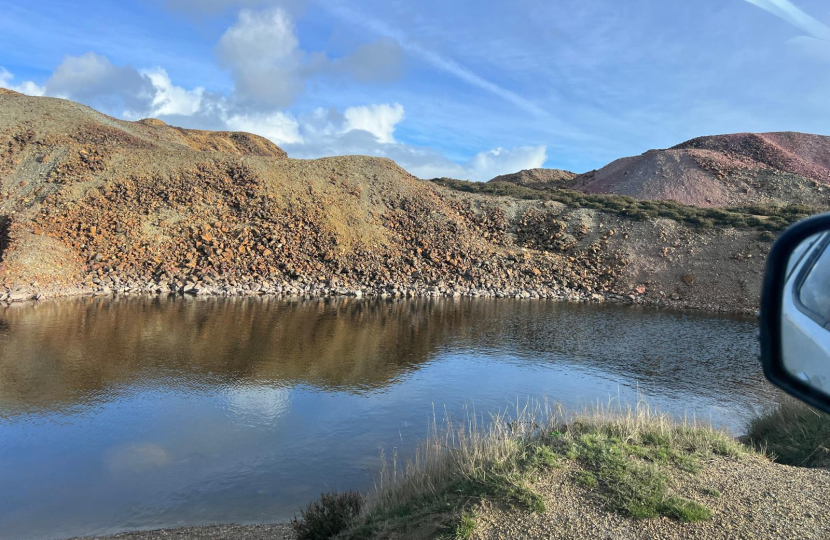
Janet Finch-Saunders, Member of the Welsh Parliament for Aberconwy is deeply concerned to learn that the UK relies heavily on imported copper rather than using her own reserves.
As it stands in 2023 the UK imported over £1.5 billion of copper. This mineral is essential for many uses from house building to green technologies – for every five houses that are planned to be built in the UK, one tonne of copper will be required, mainly for plumbing and electrical wiring.
Despite this, the UK Government have not put copper on the UK’s critical minerals lists unlike the EU, USA, Canada, Japan, India, China and South Korea.
Commenting on the story Janet said:
“I am becoming deeply concerned about our ability to acquire essential resources. Copper is clearly going to be essential for not only Wales’s future but for the UK’s as a whole.
“Copper is not only vital for building works but is critical to the manufacture of much of the green technology, wind turbines, electric vehicles, solar panels and the electrical infrastructure, that will be needed to support the transition to Net Zero.
“Every society engaged in copper mining must weigh its benefits against the impacts of extraction. Imported copper reflects these trade-offs, even if they go unnoticed. Mining copper inhouse would shed light on these challenges and enable better impact management.
“Locally sourcing it offers clear advantages and long-term benefits, not to mention it will bring skills and higher paid jobs into our country.
“At a time of global insecurity we must be looking at ways to improve our own sustainability, and not rely so heavily on imports from abroad.
“I am therefore calling on the UK Government to place copper on the UK’s critical mining list so that we can begin to invest in a future that sees Wales as a leader in new technologies.”
ENDS
Mae Janet Finch-Saunders, yr Aelod o’r Senedd dros Aberconwy, yn bryderus iawn o glywed bod y DU yn dibynnu'n helaeth ar gopr wedi'i fewnforio yn hytrach na defnyddio ei chronfeydd wrth gefn ei hun.
Yn 2023, mewnforiodd y DU dros £1.5 biliwn o gopr. Mae'r mwyn hwn yn hanfodol ar gyfer pob math o ddefnyddiau, o adeiladu tai i dechnolegau gwyrdd – ar gyfer pob pum tŷ y bwriedir eu hadeiladu yn y DU, bydd angen un dunnell o gopr, yn bennaf ar gyfer plymio a gwifrau trydanol.
Er gwaethaf hyn, dydy Llywodraeth y DU ddim wedi rhoi copr ar restrau mwynau hanfodol y DU yn wahanol i'r UE, UDA, Canada, Japan, India, Tsieina a De Korea.
Wrth sôn am y stori dywedodd Janet:
"Rwy'n bryderus iawn am ein gallu i gaffael adnoddau hanfodol. Mae'n amlwg y bydd copr yn hanfodol nid yn unig ar gyfer dyfodol Cymru ond ar gyfer y DU gyfan.
"Mae copr nid yn unig yn hanfodol ar gyfer gwaith adeiladu ond mae'n hanfodol ar gyfer gweithgynhyrchu llawer o'r dechnoleg werdd, tyrbinau gwynt, cerbydau trydan, paneli solar a'r seilwaith trydanol, y bydd eu hangen i gefnogi'r newid i Sero Net.
"Rhaid i bob cymdeithas sy'n ymwneud â mwyngloddio copr bwyso a mesur manteision yn erbyn effeithiau echdynnu. Mae copr a fewnforir yn adlewyrchu'r cyfaddawdau hyn, hyd yn oed os ydyn nhw o’r golwg. Byddai mwyngloddio copr yn fewnol yn taflu goleuni ar yr heriau hyn ac yn ein galluogi i reoli effaith yn well.
"Mae cael gafael arno’n lleol yn cynnig manteision clir a manteision hirdymor, heb sôn am y ffaith y bydd yn dod â sgiliau a swyddi â chyflogau uwch i'n gwlad.
"Ar adeg o ansicrwydd byd-eang, mae'n rhaid i ni edrych ar ffyrdd o wella ein cynaliadwyedd ein hunain, a pheidio â dibynnu mor drwm ar fewnforion o dramor.
"Rydw i felly yn galw ar Lywodraeth y DU i osod copr ar restr mwynau hanfodol y DU fel y gallwn ddechrau buddsoddi mewn dyfodol lle mae Cymru ar flaen y gad o ran technolegau newydd."
DIWEDD

